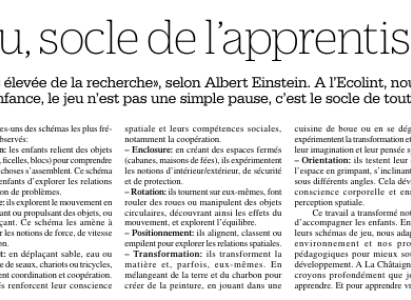Play is the highest form of research. – A. Einstein.
As a teaching team, we explored play schemas — those spontaneous behaviors described by Jean Piaget. By observing our students over several months, we deepened our understanding of play and strengthened our pedagogy. Today, we share this approach to promote play as a central driver of learning.
Here are some of the most frequently observed schemas:
Connection: Children connect objects (train tracks, strings, blocks) to understand how things fit together. This helps them explore relationships and problem-solving.
Trajectory: They explore movement by throwing, rolling, or propelling objects, or by swinging. This leads them to experiment with force, speed, and direction.
Transport: By moving sand, water, or objects using buckets, carts, or tricycles, they develop coordination and cooperation. These activities enhance spatial awareness and social skills, especially teamwork.
Enclosure: Creating enclosed spaces (dens, fairy houses), they experiment with inside/outside, safety, and protection.
Rotation: They spin themselves, roll wheels, or handle circular objects, discovering the effects of motion and exploring balance.
Positioning: They line up, sort, or stack objects to explore spatial relationships.
Transformation: They transform materials — and sometimes themselves. Whether mixing soil and charcoal to create paint, playing in a mud kitchen, or dressing up, they explore transformation and nurture imagination and symbolic thinking.
Orientation: They test their bodies in space by climbing, leaning, or viewing from different angles. This develops body awareness and enriches their spatial perception.
This work has transformed how we support children. By identifying their play schemas, we adapt the environment and our teaching approach to better support their development.
At Ecolint, we deeply believe that to play is to learn. And for children to truly learn, they need a rich, stimulating space designed to support their natural drive for discovery.
—
Originally written in French, by Briony Jobson, Class Teacher at the Primary School of Ecolint’s La Châtaigneraie Campus (Vaud), for Le Temps newspaper.
